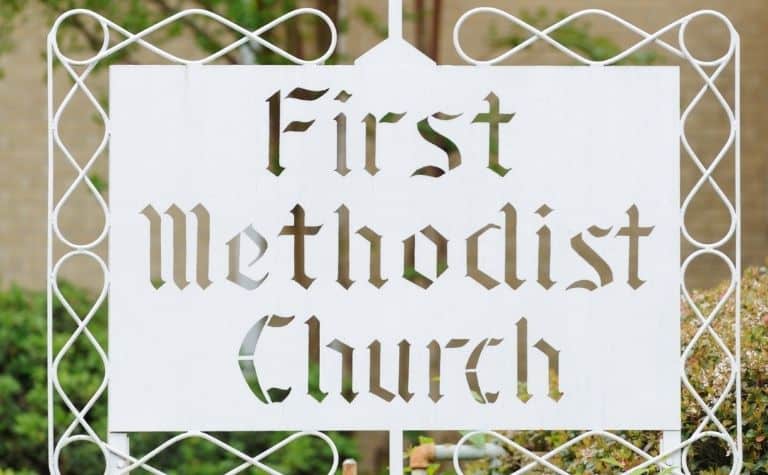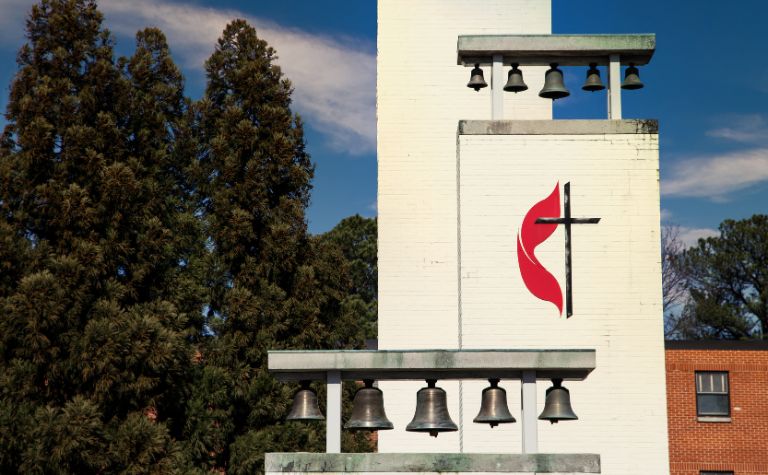The Methodist branch of Protestant Christianity has a rich theological history. The tradition, founded by John Wesley (1703-1791), has solid doctrinal convictions about death and the afterlife. But what exactly do Methodists believe happens after a person dies? Do they believe in the existence of purgatory like Catholics do, or something else?
The Methodist church doesn’t believe in the doctrine of purgatory like the Roman Catholic church. Methodism’s belief statement, The Articles of Religion, clearly teaches that purgatory has no biblical basis but is less clear on what it affirms. However, there is evidence that John Wesley believed in the immediate state.
What’s the difference between purgatory and the intermediate state? What does the largest Methodist denomination, the United Methodist Church, teach about purgatory? What exactly did John Wesley say about purgatory and the intermediate state? Keep reading to learn more.
Also, see Methodist vs. Evangelical: What’s the Difference? to learn more.

What Does Methodism Teach About Purgatory?
The doctrine of purgatory is historically associated with the Catholic church, though a few non-Catholics believe in it. Purgatory isn’t a place, but a condition, according to Pope John Paul II (1920-2005).
Because it’s an essential belief in Catholicism, people wonder if other historic Christian traditions like Methodism also believe it. (Also see What Do Methodists Believe About Death?)
What exactly is purgatory? Purgatory is a temporary state of purification for believers who lived unrighteous lives while on Earth.
In purgatory, people receive consequences for their sins. When their punishment is sufficient concerning their unrighteousness, they go to heaven. (Also see What Do Methodists Believe About Heaven?)
Catholic teachers generally admit that there is little biblical evidence for the doctrine. However, they find support for it in the Apocrypha (the preferred Protestant term) or Deuterocanonical books (the preferred Catholic term). (Also see Methodist vs. Catholic: What’s the Difference?)
What is the textual support for purgatory? A frequently-cited passage in support of purgatory is 2 Maccabees 12:38-45, which isn’t in the Bibles of Methodists. In the passage, Judas Maccabeus discovers that soldiers who died in battle held onto forbidden idols secretly.
It reads, “[Judas] also took up a collection from all his men, totaling about four pounds of silver, and sent it to Jerusalem to provide for a sin offering. Judas did this noble thing because he believed in the resurrection of the dead.”
It continues, “If he had not believed that the dead would be raised, it would have been foolish and useless to pray for them. In his firm and devout conviction that all of God’s faithful people would receive a wonderful reward, Judas made provision for a sin offering to set free from their sin those who had died.” (2 Maccabees 12:38-45, emphasis added)
Methodist teaching rejects the doctrine of purgatory as unbiblical. It denies the practice of praying for the dead and the idea that forgiveness of sin can occur after physical death. Methodist teaching denies these concepts because it finds no basis in Scripture for them. [1] (Also see What Bible Translation Do Methodists Read?)
In The Articles of Religion, which is the historic doctrinal statement of the Methodist tradition, most consider purgatory a human invention, “Of Purgatory: The Romish doctrine concerning purgatory, pardon, worshiping, and adoration, as well of images as of relics, and also invocation of saints, is a fond thing, vainly invented, and grounded upon no warrant of Scripture, but repugnant to the Word of God.” Article XIV, The Articles of Religion
If Methodists don’t believe in purgatory, what do they believe in? Methodists, like other Protestants, believe in the so-called “intermediate state.” The table below contrasts the two doctrines.
| Purgatory | The Intermediate State | |
|---|---|---|
| Nature | Since believers who die haven’t experienced perfection, i.e., they are still in sin, their remaining sin needs to be purged. | The condition of believers and unbelievers between their physical death and resurrection. |
| Purpose | Since believers who die haven’t experienced perfection, i.e. they are still in sin, their remaining sin needs to be purged. | Believers and unbelievers have shed their earthly bodies at the time of physical death and await their new bodies. There is no purification aspect to the intermediate state. |
| Result | When all sins have been purged, the believer can go to heaven. The prayers of people on Earth can encourage the process. | Believers are in the presence of God upon death but await their new bodies. Unbelievers go to hell upon death but await their new bodies. All people will receive new bodies at the Second Coming of Christ. |
| Atonement | Christ’s death doesn’t sufficiently atone for all unrighteousness, making further purging after death necessary. | Christ’s death sufficiently atones for all unrighteousness, making further purging after death unnecessary. |

What Do Methodists Believe Happens When A Person Dies?
In an article titled “What Happens After a Person Dies?” on the website of the largest Methodist denomination, the United Methodist Church (UMC), the author is uncommitted to an answer to the question. (Also see Methodist vs. Pentecostal: What’s the Difference?)
Methodist teaching is more explicit about what it’s opposed to (purgatory) than what it is for (e.g., soul sleep, the intermediate state, immediate resurrection).
The author writes, “Throughout history, people have wondered what happens immediately after death. While we may want a clear-cut answer, United Methodists do not provide one in our doctrinal standards. This is because the scriptures themselves offer no one clear teaching on what happens to the dead between their death and the resurrection and judgment at the Last Day.” [2]
However, according to the article, purgatory is not the answer, and the author leaves the idea of an intermediate state open. “The Protestant churches rejected the Roman Catholic idea of purgatory. Purgatory is believed to be a place where the souls of the faithful dead endure a period of purification and cleansing, aided by the prayers of the living, prior to the resurrection, final judgment, and new creation.”
The explanation continues, “To be clear, it is this particular description of the intermediate state between death and resurrection that Protestants, including the Wesleys… have rejected. We have not rejected the idea that there may be some sort of intermediate state.”
Was Wesley clearer about his belief in the intermediate state? Some Methodists believe he was. (Also see Methodist vs. Anglican: What’s the Difference?)

Did John Wesley Believe in Purgatory?
Some Methodist teachers argue that Wesley believed in the intermediate state. People use passages like the one below to argue that he affirmed the doctrine.
“Even in paradise, in the intermediate state between death and the resurrection, we shall learn more concerning these in an hour than we could in an age, during our stay in the body. We cannot tell indeed how we shall then exist or what kind of organs we shall have: The soul will not be encumbered with flesh and blood, but it will probably have some sort of ethereal vehicle, even before God clothes us ‘with our nobler house of empyrean light.'” [3]
Some Methodists say that while Wesley used the term “intermediate state,” he wasn’t necessarily teaching the doctrine. Furthermore, in this description, it’s argued that Wesley was vague when he made statements like “we cannot tell indeed how we shall then exist” and “but probably it will have some sort of ethereal vehicle.”
However, some Methodist teachers, like Ted Campbell, in his book Methodist Doctrine: The Essentials, writes that John Wesley believed in the intermediate state between death and the final judgment “where believers would share in the ‘bosom of Abraham’ or ‘paradise,’ even continuing to grow in holiness there.”
The UMC website offers this summary that most Methodists would agree with, “Whatever happens immediately after death, we live with hope in life eternal and in the assurance that ‘neither death, nor life, nor angels, nor rulers, nor things present, nor things to come, nor powers, nor height, nor depth, nor anything else in all creation, will be able to separate us from the love of God in Christ Jesus our Lord.’ (Romans 8:38-39).” [2]
References:
[1] Source
[2] Source
[3] Source
Related Questions
Methodism is a prominent branch of Protestant Christianity that dates to the mid-18th century. Pentecostalism is a movement within Protestantism that originated in the early 20th century. What's the...
Methodism and Lutheranism are two of the most influential Protestant Christian denominations. Many of their core beliefs are the same, yet they also have critical theological...
